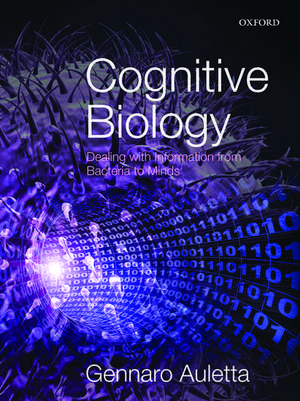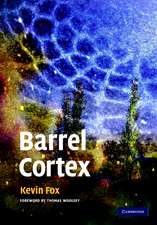Cognitive Biology: Dealing with Information from Bacteria to Minds
Autor Gennaro Aulettaen Limba Engleză Hardback – 14 iul 2011
Preț: 773.36 lei
Preț vechi: 1087.40 lei
-29% Nou
Puncte Express: 1160
Preț estimativ în valută:
147.98€ • 154.20$ • 122.53£
147.98€ • 154.20$ • 122.53£
Carte disponibilă
Livrare economică 03-08 martie
Preluare comenzi: 021 569.72.76
Specificații
ISBN-13: 9780199608485
ISBN-10: 0199608482
Pagini: 880
Ilustrații: 332 b/w line and halftone illustrations, 8pp colour plate section
Dimensiuni: 195 x 252 x 48 mm
Greutate: 2.12 kg
Ediția:New.
Editura: OUP OXFORD
Colecția OUP Oxford
Locul publicării:Oxford, United Kingdom
ISBN-10: 0199608482
Pagini: 880
Ilustrații: 332 b/w line and halftone illustrations, 8pp colour plate section
Dimensiuni: 195 x 252 x 48 mm
Greutate: 2.12 kg
Ediția:New.
Editura: OUP OXFORD
Colecția OUP Oxford
Locul publicării:Oxford, United Kingdom
Recenzii
Auletta integrates in an overarching treatise several scientific topics of greatest currency: informatics, evolutionary biology, neurobiology and cognitive science, and navigates the diverse topics with amazing breadth and depth.
Most people in theoretical neurobiology and systems neuroscience will applaud this approach and nearly everyone will learn something new from this book... It is unique in its eclectic and integrative approach spanning nearly every current field of the physical and biological sciences to address fundamental issues about how the brain works.
Auletta's endeavor in his book on Cognitive Biology is to catch the complexity of the brain and mind as it is rooted in biology. This requires building a new discipline which will bridge the gap between biological complexity and the treatment of information at the quantum mechanical level. The novelty and the success of this enterprise is backed by a striking amount of knowledge in neuroscience, cognitive science, physics and philosophy.
Most people in theoretical neurobiology and systems neuroscience will applaud this approach and nearly everyone will learn something new from this book... It is unique in its eclectic and integrative approach spanning nearly every current field of the physical and biological sciences to address fundamental issues about how the brain works.
Auletta's endeavor in his book on Cognitive Biology is to catch the complexity of the brain and mind as it is rooted in biology. This requires building a new discipline which will bridge the gap between biological complexity and the treatment of information at the quantum mechanical level. The novelty and the success of this enterprise is backed by a striking amount of knowledge in neuroscience, cognitive science, physics and philosophy.
Notă biografică
Gennaro Auletta is Aggregate Professor in the Gregorian University, Researcher in the Cassino University, and Scientific Director of the STOQ Project. He is also visiting professor in the University of Notre Dame, associate of the Faraday Institute of the Cambridge University, and member of the Linnean Society of London. After taking his degree in philosophy at La Sapienza University in Rome he took his Ph.D and his Postdoc in Philosophy at the same university. His philosophical interests are logic, philosophy of nature (with special connections with quantum mechanics and biology), philosophy of mind, and metaphysics. In science, his main interests are in quantum mechanics (quantum information, foundations, interpretation). For the last ten years his research interests have addressed issues in the treatment of information by biological systems (from bacteria to human brain), in cognitive neurosciences.











